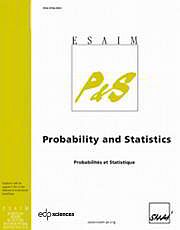Crossref Citations
This article has been cited by the following publications. This list is generated based on data provided by Crossref.
Schifano, Elizabeth D.
Strawderman, Robert L.
and
Wells, Martin T.
2010.
Majorization-Minimization algorithms for nonsmoothly penalized objective functions.
Electronic Journal of Statistics,
Vol. 4,
Issue. none,
El Gheche, Mireille
Pesquet, Jean-Christophe
and
Farah, Joumana
2013.
A proximal approach for optimization problems involving kullback divergences.
p.
5984.
Al Mohamad, Diaa
and
Broniatowski, Michel
2015.
Geometric Science of Information.
Vol. 9389,
Issue. ,
p.
417.
Lan, Hua
Wang, Xuezhi
Pan, Quan
Yang, Feng
Wang, Zengfu
and
Liang, Yan
2016.
A survey on joint tracking using expectation–maximization based techniques.
Information Fusion,
Vol. 30,
Issue. ,
p.
52.
Al Mohamad, Diaa
and
Broniatowski, Michel
2016.
A Proximal Point Algorithm for Minimum Divergence Estimators with Application to Mixture Models.
Entropy,
Vol. 18,
Issue. 8,
p.
277.
Balakrishnan, Sivaraman
Wainwright, Martin J.
and
Yu, Bin
2017.
Statistical guarantees for the EM algorithm: From population to sample-based analysis.
The Annals of Statistics,
Vol. 45,
Issue. 1,
El Gheche, Mireille
Chierchia, Giovanni
and
Pesquet, Jean-Christophe
2018.
Proximity Operators of Discrete Information Divergences.
IEEE Transactions on Information Theory,
Vol. 64,
Issue. 2,
p.
1092.
Guyeux, Christophe
Chrétien, Stéphane
Bou Tayeh, Gaby
Demerjian, Jacques
and
Bahi, Jacques
2019.
Introducing and Comparing Recent Clustering Methods for Massive Data Management in the Internet of Things.
Journal of Sensor and Actuator Networks,
Vol. 8,
Issue. 4,
p.
56.
Chrétien, Stéphane
Dombry, Clément
and
Faivre, Adrien
2019.
The Guedon-Vershynin Semi-definite Programming Approach to Low Dimensional Embedding for Unsupervised Clustering.
Frontiers in Applied Mathematics and Statistics,
Vol. 5,
Issue. ,
Laus, Friederike
and
Steidl, Gabriele
2019.
Multivariate Myriad Filters Based on Parameter Estimation of Student-$t$ Distributions.
SIAM Journal on Imaging Sciences,
Vol. 12,
Issue. 4,
p.
1864.
Ghosh, Avishek
Pananjady, Ashwin
Guntuboyina, Aditya
and
Ramchandran, Kannan
2020.
Max-affine regression with universal parameter estimation for small-ball designs.
p.
2706.
Debavelaere, Vianney
and
Allassonnière, Stéphanie
2021.
On the curved exponential family in the Stochastic Approximation Expectation Maximization Algorithm.
ESAIM: Probability and Statistics,
Vol. 25,
Issue. ,
p.
408.
Choi, Haeung
Park, Sangjun
and
Lee, Heung-No
2021.
Covert Anti-Jamming Communication Based on Gaussian Coded Modulation.
Applied Sciences,
Vol. 11,
Issue. 9,
p.
3759.
Chang, Wennan
Zhang, Chi
and
Cao, Sha
2022.
Response to ‘Letter to the Editor: on the stability and internal consistency of component-wise sparse mixture regression based clustering’, Zhanget al..
Briefings in Bioinformatics,
Vol. 23,
Issue. 4,
Chatterjee, Sarthak
Romero, Orlando
and
Pequito, Sérgio
2022.
Analysis of a generalised expectation–maximisation algorithm for Gaussian mixture models: a control systems perspective.
International Journal of Control,
Vol. 95,
Issue. 10,
p.
2734.
Ghosh, Avishek
Pananjady, Ashwin
Guntuboyina, Adityanand
and
Ramchandran, Kannan
2022.
Max-Affine Regression: Parameter Estimation for Gaussian Designs.
IEEE Transactions on Information Theory,
Vol. 68,
Issue. 3,
p.
1851.
Hertrich, Johannes
Nguyen, Dang-Phuong-Lan
Aujol, Jean-Francois
Bernard, Dominique
Berthoumieu, Yannick
Saadaldin, Abdellatif
and
Steidl, Gabriele
2022.
PCA reduced Gaussian mixture models with applications in superresolution.
Inverse Problems & Imaging,
Vol. 16,
Issue. 2,
p.
341.
Cavicchioli, Maddalena
2023.
LIKELIHOOD-BASED ANALYSIS IN MIXTURE GLOBAL VARs.
Journal of Mathematical Sciences,
Vol. 271,
Issue. 3,
p.
341.
Hagemann, Paul
Hertrich, Johannes
Casfor, Maren
Heidenreich, Sebastian
and
Steidl, Gabriele
2024.
Mixed noise and posterior estimation with conditional deepGEM.
Machine Learning: Science and Technology,
Vol. 5,
Issue. 3,
p.
035001.

